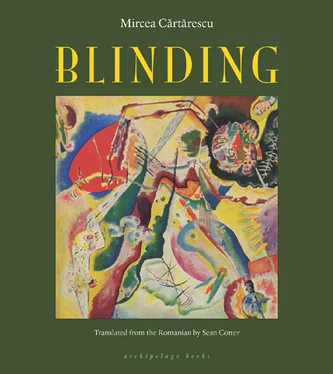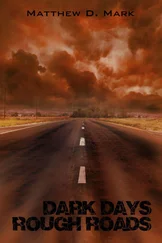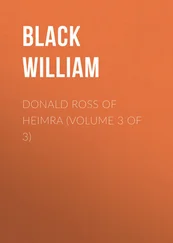Webs with tiny spider babies at one end filled the golden air, tangled in the tender curling grapevines and garden trellises, and were pushed toward the edge of the village, where the old cemetery sat in the sun like a toad in Brumaire’s last days. There, the arms of the crosses caught so many spider webs that soon the entire cemetery wore a silky lace. Below ground, in narrow pine houses, the dead were starving. For the past forty days, no one had come to the church to remember them. While the old priest wept among the icons like the captain of a leaky boat, for forty days no kolaches or coliva or rice with milk had come down from the living. Fearful they would die a second time, from hunger and oblivion, the dead began to stir, like a dangerous underground river. Chattering their powerful teeth, they began to break the shards of wood, spongy and full of cockchafer larvae, and they dug tunnels to each other like moles, to consult in twos or threes or, finally, all of them together, in their underground village, packed into an alcove whose walls ran with roots, where the urns above their skulls glowed like crystals. Three hundred dead, weak from the long fast, but animated with a fury only the departed can know, knocked their livid, moldy skulls and chafed their blackened clothes against each other. They held long, frenzied meetings, and stared at each other with gaping eye sockets full of worms. At the start of winter, at nightfall on the feast day of Saints Mina, Ermoghen, and Eugraf, a putrid, dry, and bare-toothed host broke a path toward the white world. There were the old dead with shanks as yellow as a cow’s, so addled they couldn’t keep track of their bones, who left knuckles and jaws behind in their ancient caskets. There were younger dead, still wrapped in long shifts, with vines of flesh as dry as pastrami on their faces and torsos, and dead women with the butterflies of their hips widened by births, and their ribcages wrapped in flesh like unbeaten hemp. There were dead children a few years old, overcome by skulls too heavy for their delicate cadavers. There were rotting dogs and cats raised up by the mania of the host they followed alongside. The poisoned air swirled overhead like green smoke, blowing toward the night’s first stars. Once they reached the houses, each went to his own people to begin the terrifying carnage, while dogs howled desperately in the courtyards. The ghouls poured through the doors and into bedrooms, where, under the eyes of women who thought they were dreaming, they pulled swaddled infants from their cribs and gleefully tore at their tender flesh, staining the clay floor with a thin layer of blood. They turned to the women, they mounted them on benches and penetrated them with their black, ithyphallic worms that hardened for the first time in ages. They cornered young men in barns, masterfully parrying desperate jabs from their pitchforks and finally grabbing them by their long braided hair, pulling off their hands and legs like they were bugs, and chomping their teeth into the nape of their necks and feeding down to the bone. Dying of fright, many villagers took the side of the undead, beating their own wives and children and then, with glassy eyes and shaking joints, going outside to slice the dog’s throat and drink its black blood. Large, wet snowflakes started to fall over the alleyways, melting into scarlet puddles. Corpses wandered at random from house to house, searching out the living. They felt for them under beds and pulled them out from behind stoves, unfazed by their screams, and then martyred them, impaling and flaying them, until late in the night, when it seemed like no one in the village was left alive. Then they set fire to the houses, and all fifty cottages began to smoke and stick out red tongues like the dragons in their icons. Only the small church in the middle of the village was black and silent, under its high, clay-tile roof with a silver fringe of snow. In front of the church, in the yard where the villagers would dance hora on Sundays, the dead gathered, one by one, filing in from the narrow streets. The sweet smell of the flesh of living, whole people wafted through the cracks in the old walls, and it made the people from under the earth hungry. The last surviving villagers were huddled in the holy site, where they knelt with clenched eyes and fingers, shaken from their purple-poppy inebriation, and prayed to the merciful Mother of God. The priest, meanwhile, the only one in the village who had never ceded to the dark flower, was preparing his tools of war, in which he put all his hope. He donned his high holy vestments, and put a silver chain around his neck, from which hung, covering his entire chest, an ebony cross inlaid with old, crooked mother-of-pearl. Arranged in front of him, taken from the church walls, were the icons that worked the greatest miracles. In a large pocket in the front of his robe, he had the glass box that held the church’s priceless treasure: the tooth of one of the two hundred adepts of the martyred Saint Nicon. In his right hand, the priest held the censer burning with incense, and in his left, the Gospels, opened to the page in which Christ the Lord drove demons from a passel of hogs. Each of the roughly forty Badislavs hung holy icons over their chests and wore an oily mark of myrrh on their foreheads.
Terrifically animated by the light of the flames, the rag and bone army deliberated. The clean skeletons, the oldest, waved limbs as long as a praying mantis’s through the falling snow. They disliked the pious murmurs inside, and the tang of incense. The fortress had to be destroyed, and everyone inside had to be sacrificed, all before the cock crowed. The accumulating snow, damp and crystalline, retreated in front of the creaky feet whose petrified toenails poked through ancient leather. The church door was nailed together with iron and had on its thick, cracked fur the marks of flintlocks and harquebuses, bloodstains, and carved Cyrillic letters, blasphemies poorly scratched in by some priest from long ago. The corpse of Baba Liubiţa, buried just a week ago, writhing with white, fat worms, moved toward the door and touched it with purple fingers. She shook her eyeless head and moved away. They would have to set it on fire, because the thick planks were as sturdy as a castle wall. The fiends came together and blew a venomous green flame from their lipless muzzles, their black tongues hanging like dogs’. The flame thrust at an ageless piece of wood, but only a few splinters caught fire and burned out almost instantly. They blew again, but the tarred oak did not light. The skeletons realized they could not triumph by themselves. They gathered, like the base of a fountain, around a circle of fire in the snow that the oldest one had lit with a torch. Their black, vacant eye sockets watched the earth inside the circle turn translucent, like deep, green water, and this water reddened, then turned more auburn, brown, black like tar, descending into the earth’s depths, where a few points and lights seemed to move. Hundreds of flitting spots, the color of crabs, appeared in the dark, crawling up the chain of light. Soon, leathery bat wings, pointed tails, hooked beaks, hunched chests, horns like a bull’s or goat’s or sheep’s or ram’s or horned viper’s or dragon’s emerged from a swamp that screamed like a woman giving birth or a man having his balls pulled off. They moved faster and faster, they swarmed like beetles, scaling the beams of light with claws and suckers, they spouted out of scaly hips, they chortled through toothy mouths in their bellies, they belched through wall-eyed, twisted faces wedged between their ass cheeks. They were demons. They sprang from the enchanted circle like the fabled coming of evil, filling the sky with wings and howls, filling the earth with squirts of venom and sperm, and filling the divine being with horror. Cricket-demons swarmed onto the church’s roof, they slid their saw-tails through the tiles and dropped long eggs inside, which burst into poisonous spiders with a hundred legs each. But the priest in his gold-threaded robes turned them to stone, dousing them with holy water. Demons tunneled through the earth and sprang up among the kneeling people, but the incense from the censer poured into their large nostrils and exploded their serpent-heads into a thousand splinters. Bat-demons grabbed up rocks, swooped over the roof and let them go. As soon as the angelic vibration of prayer reached them, however, the stones stopped in the air and opened like enormous buds, spreading fleshy petals, strangely beautiful, until the sky over the church was filled with multicolored flowers. Insane with rage, demons scuttled onto the walls, they scurried over the roof, scratching and scraping with their claws, until no part of the holy place could be seen under the wormy swarm, the demented tangle, the furious ravel of wings and antennae.
Читать дальше












